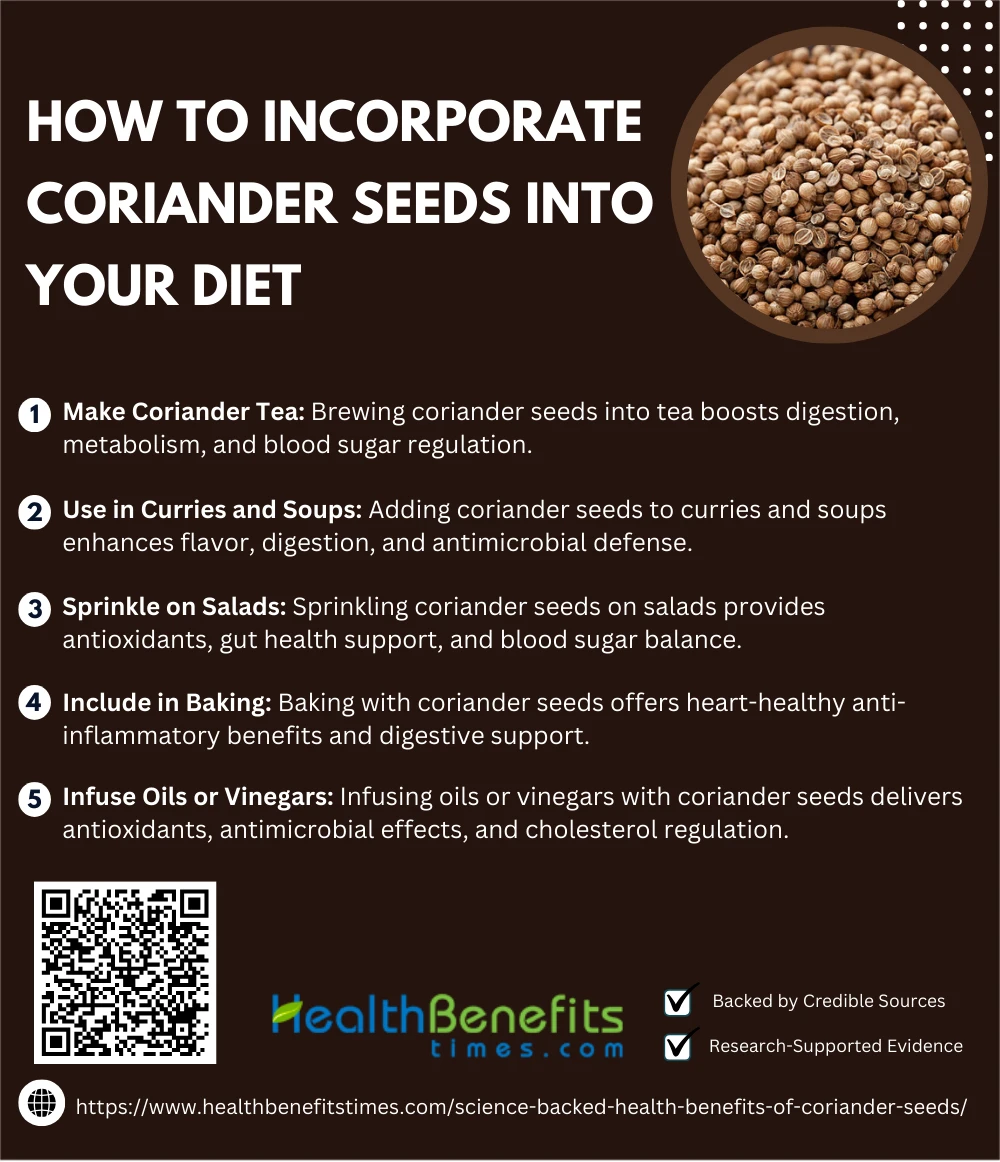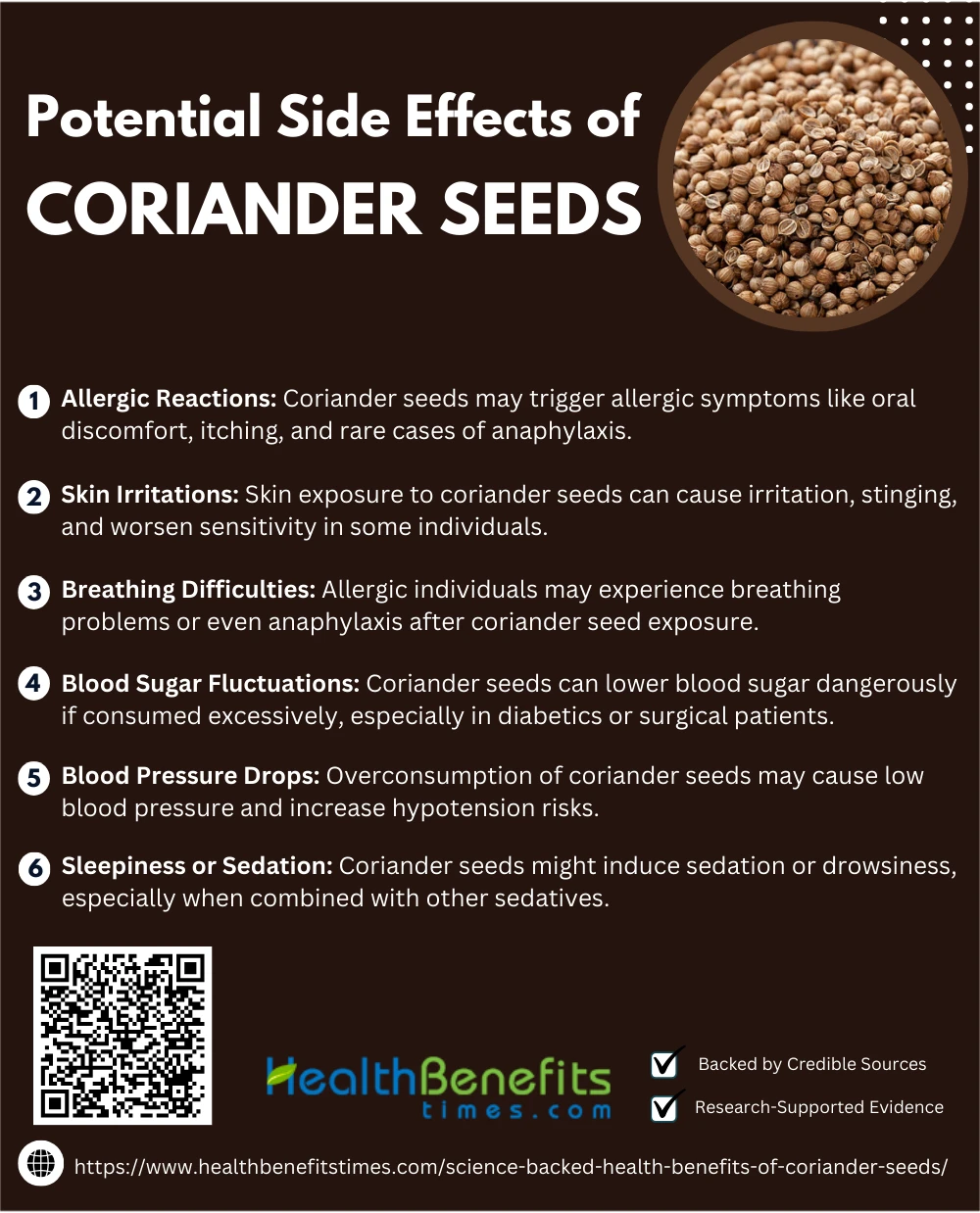- Coriander seeds are the dried fruit of the Coriandrum sativum plant, commonly used as a spice in culinary dishes worldwide.
- Science-backed research highlights that coriander seeds possess powerful anti-inflammatory properties, supporting overall health and wellness.
- Additionally, these seeds are known for their ability to regulate blood sugar levels and improve heart health, backed by scientific evidence.
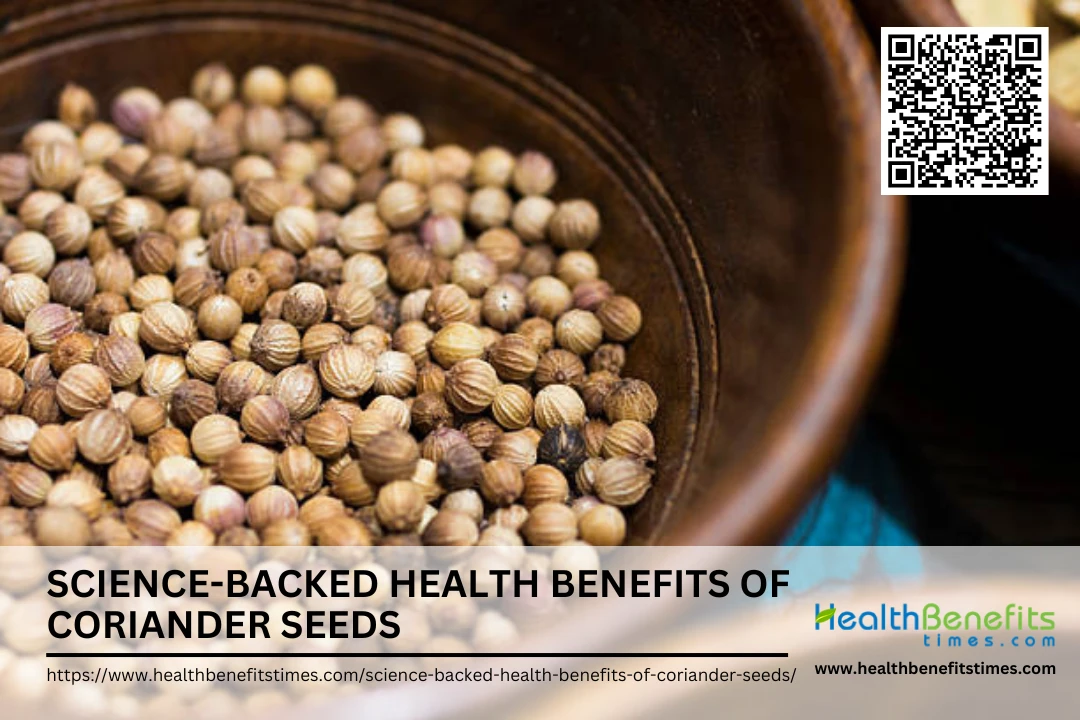 Coriander seeds are the dried fruits of the Coriandrum sativum plant, widely used as a culinary spice and medicinal herb, known for their rich nutritional and phytochemical profile study on coriander seeds’ bioactive compounds. Throughout history, coriander seeds have been revered not only for their aromatic flavor but also for their wide array of health-promoting properties. Recent scientific investigations have confirmed that coriander seeds possess significant antioxidant, antimicrobial, and anti-inflammatory activities, which can contribute to improved heart health, better digestion, and blood sugar regulation. Additionally, studies suggest that incorporating coriander seeds into the diet may help support brain function, reduce anxiety, and offer protective effects against chronic diseases.
Coriander seeds are the dried fruits of the Coriandrum sativum plant, widely used as a culinary spice and medicinal herb, known for their rich nutritional and phytochemical profile study on coriander seeds’ bioactive compounds. Throughout history, coriander seeds have been revered not only for their aromatic flavor but also for their wide array of health-promoting properties. Recent scientific investigations have confirmed that coriander seeds possess significant antioxidant, antimicrobial, and anti-inflammatory activities, which can contribute to improved heart health, better digestion, and blood sugar regulation. Additionally, studies suggest that incorporating coriander seeds into the diet may help support brain function, reduce anxiety, and offer protective effects against chronic diseases.
Nutritional Profile of Coriander Seeds
Coriander seeds are small but packed with nutrients, offering essential vitamins, minerals, fiber, and antioxidants. Their rich nutritional profile forms the foundation for many of their powerful, science-backed health benefits.
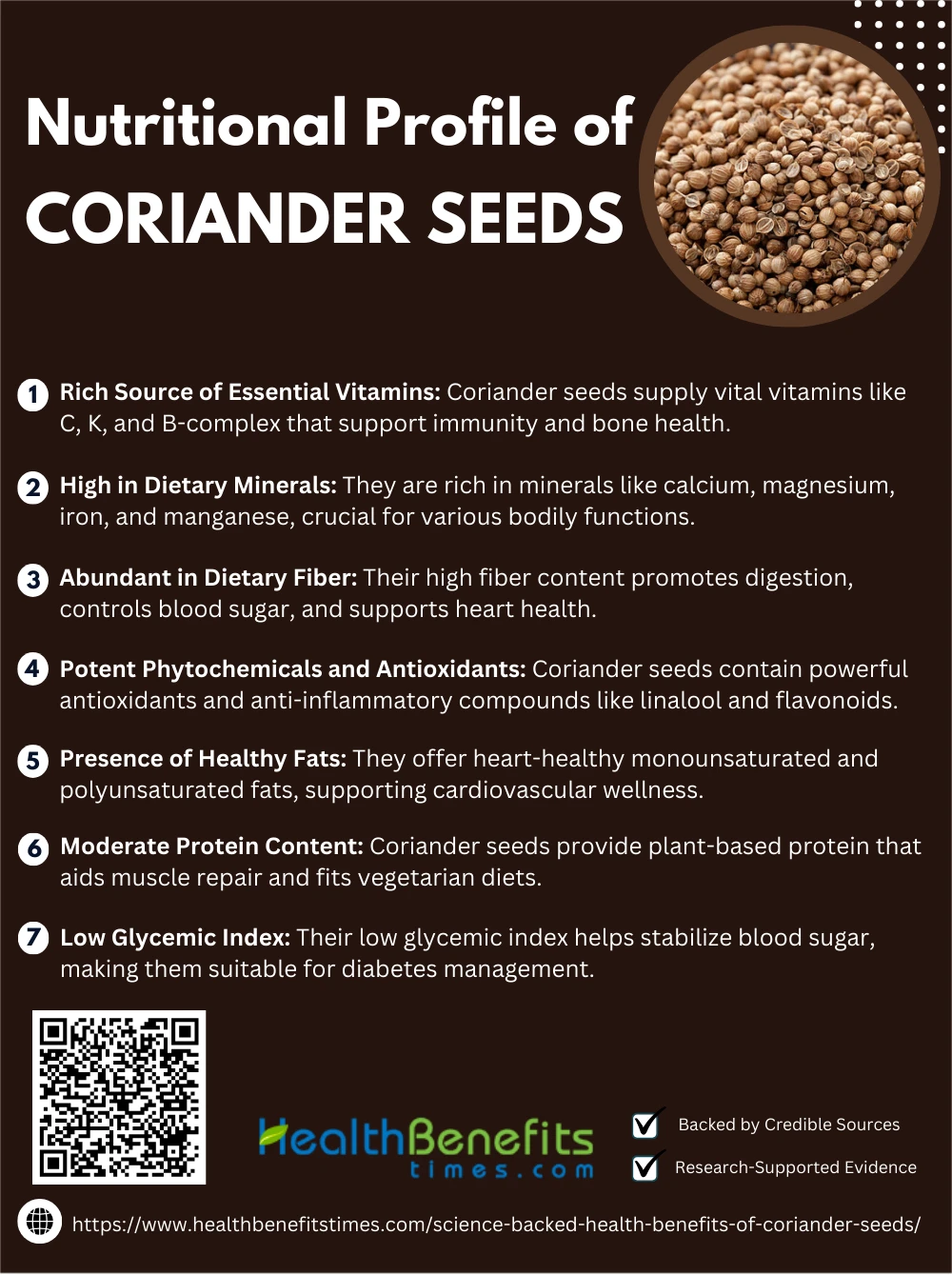 1. Rich Source of Essential Vitamins
1. Rich Source of Essential Vitamins
Coriander seeds are packed with vitamins such as Vitamin C, Vitamin K, and some B-complex vitamins. Vitamin C acts as a potent antioxidant that helps protect the body against oxidative stress, while Vitamin K is crucial for blood clotting and bone metabolism. According to a study on the nutritional composition of coriander seeds, these micronutrients contribute significantly to the seeds’ immune-supporting properties.
2. High in Dietary Minerals
Coriander seeds provide essential minerals like calcium, magnesium, iron, and manganese. Iron is vital for preventing anemia, and magnesium supports muscle and nerve function. Calcium is necessary for strong bones and teeth, and manganese plays a role in metabolism and bone development. Research has demonstrated that coriander seeds can effectively boost daily mineral intake.
3. Abundant in Dietary Fiber
Dietary fiber in coriander seeds promotes digestive health by aiding bowel movements and maintaining gut flora. It also helps in controlling blood sugar spikes and reducing cholesterol levels. The significant fiber content makes coriander seeds beneficial for weight management and heart health, as highlighted in modern phytochemical studies.
4. Potent Phytochemicals and Antioxidants
Coriander seeds are rich in phytochemicals like linalool, terpenoids, and flavonoids. These compounds are recognized for their antioxidant, anti-inflammatory, and antimicrobial activities. The antioxidant power of these phytochemicals protects the body’s cells from free radical damage, as shown in studies evaluating coriander seed extracts.
5. Presence of Healthy Fats
Though coriander seeds are not primarily consumed for their fat content, they contain beneficial oils rich in monounsaturated and polyunsaturated fatty acids. These healthy fats support cardiovascular health and may contribute to anti-inflammatory benefits. Scientific assessments confirm the lipid profile of coriander seeds as favorable for heart wellness.
6. Moderate Protein Content
Coriander seeds also provide moderate amounts of plant-based protein, which is essential for muscle repair, hormone production, and enzymatic reactions in the body. This feature makes them a valuable addition to vegetarian and vegan diets, enhancing their nutritional diversity.
7. Low Glycemic Index
Foods with a low glycemic index help in maintaining stable blood sugar levels. Coriander seeds have been shown to exert hypoglycemic effects, partly because of their carbohydrate composition and phytochemical synergy. Thus, they are suitable for individuals aiming to manage diabetes or pre-diabetic conditions.
Science-Backed Health Benefits of Coriander Seeds
Coriander seeds have been valued for centuries in traditional medicine, and modern research now confirms many of their health benefits, from supporting digestion to promoting heart health and reducing inflammation.
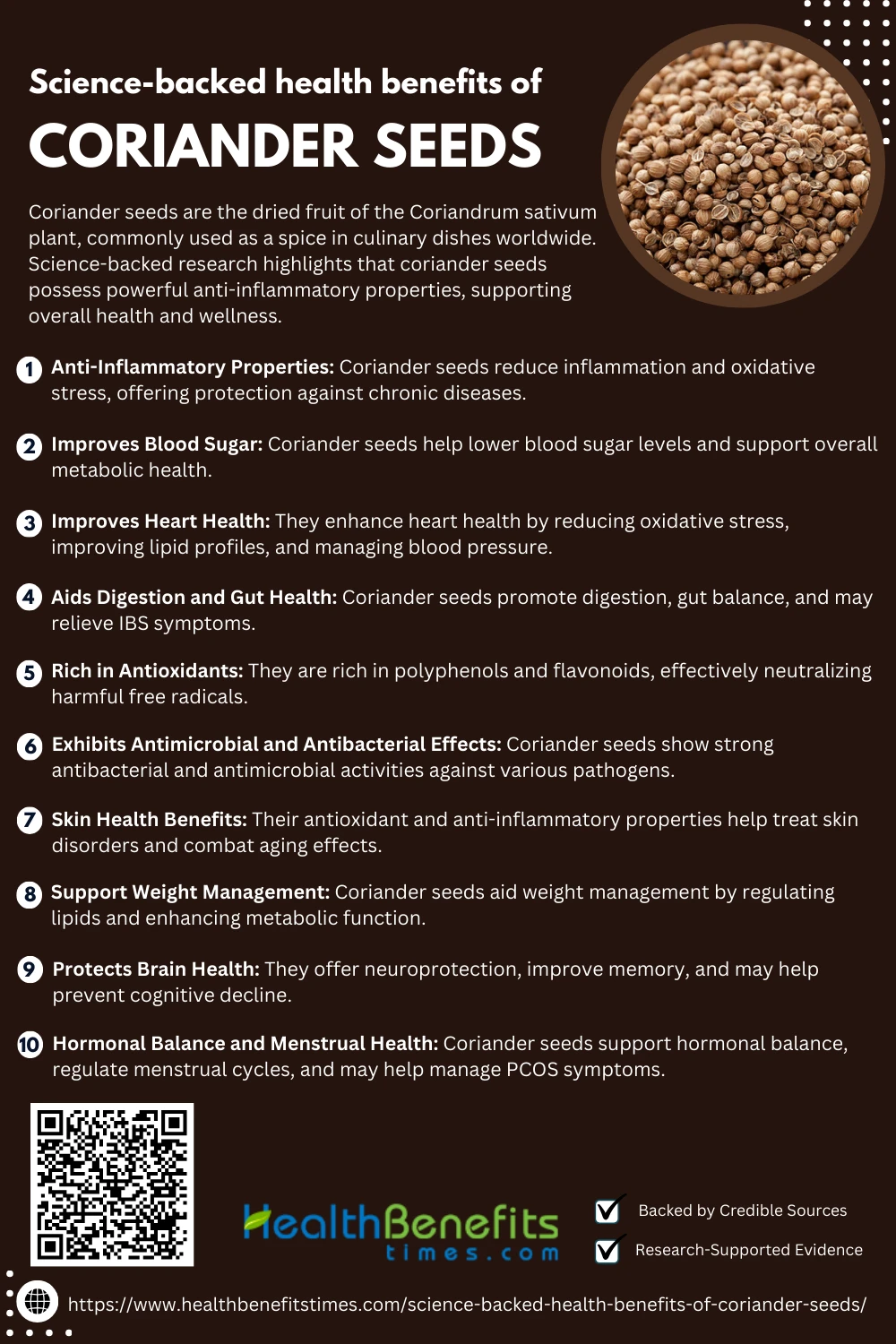 1. Anti-Inflammatory Properties
1. Anti-Inflammatory Properties
Coriander seeds are known for their significant anti-inflammatory benefits. Research has shown that Coriandrum sativum seed extract reduces systemic inflammation and oxidative stress, providing neuroprotection. (1) The antioxidants present in coriander are linked to decreased inflammation. Furthermore, studies highlight its antibacterial and antioxidative activities. (2) Coriander oil is also traditionally used to relieve joint pain. Regular consumption of coriander seeds may thus protect against chronic diseases linked to inflammation.
2. Improves Blood Sugar
Coriander seeds have demonstrated remarkable potential in improving blood sugar control. In a notable animal study, coriander seed extract significantly lowered blood glucose levels within six hours. Additionally, coriander’s bioactive compounds support metabolic health. (3) Traditional practices advocate coriander for maintaining glucose balance. (4) Drinking coriander seed water is also associated with improved digestion and blood sugar regulation. (5) These properties position coriander as a beneficial supplement for blood sugar management.
3. Improves Heart Health
Coriander seeds play a vital role in promoting heart health by mitigating oxidative stress and regulating lipid profiles. Studies have shown that coriander seed extract significantly reduces oxidative damage and cellular senescence in heart tissues. In combination with exercise, coriander seed consumption has been found to enhance heart energy indices. Dietary supplementation lowered LDL cholesterol levels, reducing cardiovascular risk. Research also indicates improvements in lipid metabolism and blood parameters. (6) Furthermore, coriander seed powder supplementation has been proven effective for managing blood pressure and cholesterol in hyperlipidemic patients. (7)
4. Aids Digestion and Gut Health
Coriander seeds are highly valued for supporting digestion and gut health. A study revealed that coriander herbal medicine significantly reduced symptoms in IBS patients. (8) Coriander stimulates stomach acid production, aiding digestion. It also offers antibacterial properties beneficial for gut balance. (3) Moreover, its role in metabolism and detoxification enhances digestive wellness. (9) Daily consumption could thus fortify digestive health effectively.
5. Rich in Antioxidants
Coriander seeds are renowned for their potent antioxidant properties, offering a natural source of polyphenols and flavonoids essential for neutralizing free radicals. Research highlights that different parts of coriander fruit, especially the seeds, exhibit significant antioxidant activities due to their high phenolic content. (10) Another study underscores that coriander seed extracts contribute to oxidative stress reduction and overall cellular protection. (11) Additionally, supercritical fluid extracts of coriander were reported to possess remarkable antioxidant capabilities. (12) Essential oils derived from coriander seeds also demonstrated promising antioxidant effects in experimental setups. (13) Furthermore, evaluation through microwave-assisted extraction techniques confirmed enhanced antioxidant activities. (14)
6. Exhibits Antimicrobial and Antibacterial Effects
Coriander seeds demonstrate notable antimicrobial and antibacterial activities, making them promising candidates for natural therapeutics. The essential oil extracted from coriander seeds shows potent antibacterial effects against both Gram-positive and Gram-negative bacteria. (15) Another investigation affirmed the seed extract’s broad-spectrum antimicrobial capabilities. (16) Furthermore, ethanol-based coriander seed extracts were found effective against major pathogenic strains. (17) Coriander seed applications in poultry demonstrated enhanced microbial resistance. (18) Additionally, microwave-assisted extraction techniques improved the antibacterial potency of coriander seed oils. (14)
7. Skin Health Benefits
Coriander seeds are highly regarded for their positive impact on skin health due to their antioxidant and anti-inflammatory properties. Research highlights their potential in treating skin disorders such as eczema and fungal infections. (19) The presence of bioactive compounds like linalool helps in soothing sensitive skin. (20) Furthermore, coriander seed extracts have been shown to combat photoaging effects from UVB exposure. (21) Studies also indicate that coriander oil helps protect skin from emotional stress damage. (22) Additionally, the use of coriander in skin formulations has demonstrated notable anti-aging properties. (23)
8. Support Weight Management
Coriander seeds have been linked to weight management benefits through lipid regulation and improved metabolic functions. Supplementation with coriander seeds significantly improved lipid profiles and reduced oxidative stress. (24) Further research revealed beneficial impacts on serum glycemic indices in diabetic patients. (25) Studies on animal models indicated coriander seed powder enhanced growth performance and body weight control. (26) Similarly, supplementation among livestock improved weight management markers. (6) Moreover, coriander extracts significantly reduced liver lipid synthesis in obese rats. (27)
9. Protects Brain Health
Coriander seeds exhibit impressive neuroprotective effects, making them beneficial for brain health. Studies show that coriander seed extract protects neurons against ischemic-reperfusion brain injury. (28) Animal model research confirmed that coriander oil could counter memory impairment and oxidative brain damage. Ethanolic extracts also significantly reduced cognitive deficits in obese-induced rats. (1) Furthermore, coriander seed oil showed positive anti-AChE effects, linked to improved learning. (29) Its role in psychiatric health as an anxiolytic agent further supports its brain-boosting potential. (30)
10. Hormonal Balance and Menstrual Health
Coriander seeds are increasingly recognized for their role in promoting hormonal balance and improving menstrual health. Studies demonstrate that coriander seed infusion helps regulate menstrual cycles and balance hormone levels. Traditional herbal remedies often employ coriander to manage excessive menstruation and hormonal irregularities. Furthermore, coriander’s essential oils show promise in addressing thyroid-related hormonal disturbances. Dietary supplementation with coriander has also improved reproductive hormone balance. (31) Recent reviews suggest its potential in managing PCOS symptoms. (32)
How to Incorporate Coriander Seeds into Your Diet
Adding coriander seeds to your diet is simple and flavorful. Whether used whole, ground, or brewed into tea, these seeds can easily enhance both your meals and your overall health.
Coriander tea is an excellent way to harness the health benefits of coriander seeds, offering digestive, anti-inflammatory, and antioxidant support. Brewing crushed coriander seeds releases bioactive compounds that improve metabolism and gastrointestinal health. (33) Regular intake of coriander tea has been linked to better blood glucose regulation. (34) Additionally, coriander infusion is a traditional remedy for enhancing kidney function and detoxification.
2. Use in Curries and Soups
Adding coriander seeds to curries and soups intensifies flavor and enhances health benefits. Coriander exhibits anti-inflammatory properties (Frontiers in Pharmacology). It also offers antimicrobial activity against foodborne pathogens. (35) Furthermore, regular intake supports healthy digestion.
3. Sprinkle on Salads
Sprinkling coriander seeds on salads not only adds a crunchy texture but also boosts health benefits. Research shows coriander is rich in antioxidants that combat inflammation. (36) Its natural antimicrobial properties enhance gut health. (37) Additionally, coriander aids in blood sugar regulation.
4. Include in Baking
Incorporating coriander seeds into baking recipes infuses goods with a warm, citrusy aroma. Studies highlight coriander’s anti-inflammatory compounds beneficial for heart health. (38) Baked items can retain these antioxidants post-cooking. Moreover, coriander supports digestive wellness.
5. Infuse Oils or Vinegars
Infusing oils or vinegars with coriander seeds imparts a robust flavor and enhances nutritional value. Coriander’s essential oils show strong antioxidant activity. These infused condiments can support antimicrobial defense and may help regulate cholesterol levels. (39) (40)
Potential Side Effects of Coriander Seeds
While coriander seeds offer numerous health benefits, excessive consumption may lead to side effects like allergic reactions or digestive issues. It’s important to use them in moderation and consult a healthcare provider.
Coriander seeds can trigger allergic reactions such as rhinorrhea, neck itching, and oral discomfort, particularly during oral challenges. Though rare, anaphylaxis from cilantro allergy has been reported. Specific IgE testing helps confirm coriander allergies.
2. Skin Irritations
Exposure to coriander seeds may cause skin irritation, stinging, and itching, particularly under chemical stressors. Although coriander is often praised for skin health, it may exacerbate sensitivity in some. (41) Sensitive individuals should exercise caution. (42)
3. Breathing Difficulties
Coriander seeds can induce breathing difficulties in individuals allergic to related plants like fennel and aniseed. (43) Severe allergic responses, including shortness of breath and anaphylaxis, have been documented. (44) Immediate medical attention is crucial if respiratory symptoms occur. (45)
4. Blood Sugar Fluctuations
Coriander seeds can significantly lower blood sugar levels, posing risks for individuals with diabetes or those undergoing surgery. (43) While often praised for their hypoglycemic effects, uncontrolled intake can cause dangerous fluctuations. (44) Caution is advised when combined with other blood sugar-lowering herbs. (46)
5. Blood Pressure Drops
Coriander seeds may lower blood pressure by acting as a natural diuretic and flushing excess sodium. However, excessive intake could cause hypotension, especially before surgeries. (43) Its blood-thinning properties also enhance this effect.
6. Sleepiness or Sedation
Preliminary studies show coriander may exert sedative effects similar to diazepam, potentially causing sleepiness. The main component, linalool, has neuropharmacological properties including sedation. (29) Therefore, coriander should be used cautiously alongside other sedative medications. (8)
Conclusion
In conclusion, coriander seeds are a powerful, science-backed natural remedy with a range of health benefits, including anti-inflammatory, blood sugar-regulating, and heart-healthy properties. Packed with essential nutrients and antioxidants, they offer digestive support and antimicrobial effects. Regular consumption of coriander seeds, whether in food or as a supplement, can help improve overall well-being. However, like any natural remedy, it’s important to use them in moderation and be mindful of potential side effects. As research continues to uncover more benefits, coriander seeds are emerging as a valuable addition to a balanced, health-conscious lifestyle.


